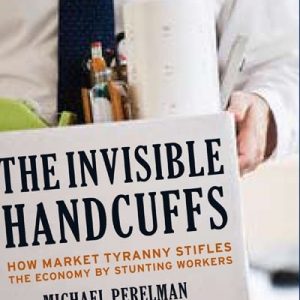Michael Perelman
The Invisible Handcuffs of Capitalism: How Market Tyranny Stifles the Economy by Stunting Workers
Monthly Review Press, New York, 2011. 360pp., $19.95 pb
ISBN 9781583672297
Reviewed by Matthijs Krul
Review
The very title of The Invisible Handcuffs of Capitalism gives the reader a general impression of the subject: a discussion of the restraining and oppressive effects of capitalism on the workforce, presented in the form of somewhat belabored metaphors (if one may risk a pun). Michael Perelman, Professor of Economics at California State University at Chico, is author of many books on the nature and history of the capitalist system and the economic thought it has produced, most written from an explicitly Marxist perspective. This book seems to be aimed at a more general audience, and is written in a more populist style – it is profuse with practical examples, Marx is only quoted occasionally in a passing manner, and while the book is certainly critical of capitalist practice it is somewhat vague on the precise extent of its opposition. That said, it serves a useful theoretical purpose: to gather the different strands of thought about the way in which classical and neoclassical economists as theorists of the capitalist economy have ignored the central role of workers and the production process itself for the reproduction of the said economy.
Perelman addresses the whole range of problems with work and the work process within capitalism: the way it stifles the creativity of the worker, the waste of social productive powers by the many jobs and technical applications created solely to safeguard the managerial power of capital, the superior knowledge workers have of the work process and the struggle over the extraction of this knowledge, the inefficiencies of production all these combine to generate within capitalism, and finally the various kinds of theoretical apologetics generated within economic theory to justify this sorry state of affairs. Many practical examples and quotations support Perelman’s case, and because this is an essential part of the capitalist working experience, yet not familiar to most working people as a subject of explicit theorizing, we may hope it serves as an eye-opener to this extent. Compared to Harry Braverman’s (1999) classic on workers within capitalism, Labor and Monopoly Capital, this work is more accessible in its writing style, and provides useful connections with economic theory itself and its failure to address the centrality of production, in particular in the work of Adam Smith….
Read the entire review on Marx & Philosophy Review of Books

Comments are closed.